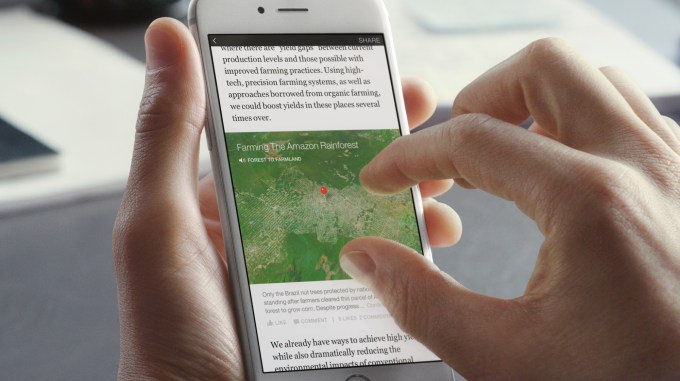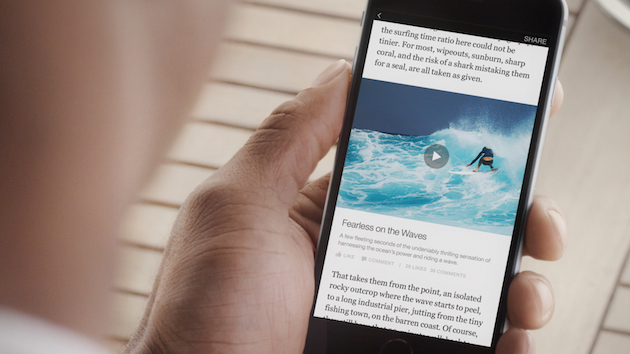[h=1]Facebook tightens control over the Media: Publishers agree to load their content in the form of ‘Instant Articles’[/h] May 13, 2015 Kishore Ganesh Leave a comment

The Media Industry has been following a downward slope for the last few years. You see, it is all due to the advancement of technology, particularly due to the Internet.
The old giants of the Newspaper Business saw their customers switch to online sources for their news, and decided that they needed to act on it, which is why they starter representing themselves online. However, these outlets, ingrained in print-culture, didn’t really understand the intricacies of being an online publication and didn’t see much success.
Then came along upstarts like Buzzfeed, which were Media Companies that revolved around modern Technology like Social Media. These upstarts thrived on all major Social Networks and learned the tricks of attracting the online populace, leading to many of their stories going viral.
Now these upstarts, and these old companies want to move forward and want to increase their traffic. Over the last few years, Facebook has become one of the biggest sources of traffic, but even then, some part of that traffic drops off due to the time it takes for the site to load.
From statistical data, we deduce that just one additional second can turn away thousands of users, and that’s why Facebook has announced that it is partnering with publishers for something called ‘Instant Articles’, where publisher’s content would load much more faster.
This would happen because the content would be stored within Facebook itself, with no need for outside linking. Indeed, multimedia-rich content can be produced, and moreover, autoplaying covers can attract a user’s attention.
Lots of customizable options are provided in order for every publisher to carve out its own unique visual style. Plus, with support for zoomable photos, Videos, Maps and other embeddable items, this is as media-rich as it gets. The best part is, all content is optimized for touch devices from the ground up, leading to a seamless harmony of touches, swipes and gestures.

These ‘Instant Stories’ have already started popping up, and will fully roll out within a week.
Facebook has experimented a lot to ensure shorter page-loading times, and some of this has been inspired by Facebook’s own App, Paper.
As for advertising, publishers have an option: To advertise themselves and get the full revenue, or to bring in Facebook and give it some part of the revenue.

This may change in the future as Facebook realizes the potential of this experiment and starts to exert its control over publishers. First by compulsorily taking a cut of their revenue, and then perhaps pressuring them into modifying their content, as Facebook would become their main source of traffic.

The New York Times, NBC News, National Geographic, The Atlantic, The Guardian, BBC News, Spiegel, Bild and Buzzfeed have already signed up and other publishers are in negotiations with Facebook.
The CEO of the New York Times, Mark Thompson, expresses his views on Instant Articles: “The New York Times already has a significant and growing audience on Facebook. We’re participating in Instant Articles to explore ways of growing the number of Times users on Facebook, improving their experience of our journalism and deepening their engagement. We have a long tradition of meeting readers where they are and that means being available not just on our own sites, but on the social platforms frequented by many current and potential Times users.”
Many have expressed fear that this could be the end for online journalism, with Facebook acting as a potential barrier to journalistic freedom, but only time will tell whether these fears are unfounded.
What do you think? Will this initiative succeed? Is so, is the future of journalism threatened?
Facebook tightens control over the Media: Publishers agree to load their content in the form of ?Instant Articles? | Tech Geek Forever

The Media Industry has been following a downward slope for the last few years. You see, it is all due to the advancement of technology, particularly due to the Internet.
The old giants of the Newspaper Business saw their customers switch to online sources for their news, and decided that they needed to act on it, which is why they starter representing themselves online. However, these outlets, ingrained in print-culture, didn’t really understand the intricacies of being an online publication and didn’t see much success.
Then came along upstarts like Buzzfeed, which were Media Companies that revolved around modern Technology like Social Media. These upstarts thrived on all major Social Networks and learned the tricks of attracting the online populace, leading to many of their stories going viral.
Now these upstarts, and these old companies want to move forward and want to increase their traffic. Over the last few years, Facebook has become one of the biggest sources of traffic, but even then, some part of that traffic drops off due to the time it takes for the site to load.
From statistical data, we deduce that just one additional second can turn away thousands of users, and that’s why Facebook has announced that it is partnering with publishers for something called ‘Instant Articles’, where publisher’s content would load much more faster.
This would happen because the content would be stored within Facebook itself, with no need for outside linking. Indeed, multimedia-rich content can be produced, and moreover, autoplaying covers can attract a user’s attention.
Lots of customizable options are provided in order for every publisher to carve out its own unique visual style. Plus, with support for zoomable photos, Videos, Maps and other embeddable items, this is as media-rich as it gets. The best part is, all content is optimized for touch devices from the ground up, leading to a seamless harmony of touches, swipes and gestures.

These ‘Instant Stories’ have already started popping up, and will fully roll out within a week.
Facebook has experimented a lot to ensure shorter page-loading times, and some of this has been inspired by Facebook’s own App, Paper.
As for advertising, publishers have an option: To advertise themselves and get the full revenue, or to bring in Facebook and give it some part of the revenue.

This may change in the future as Facebook realizes the potential of this experiment and starts to exert its control over publishers. First by compulsorily taking a cut of their revenue, and then perhaps pressuring them into modifying their content, as Facebook would become their main source of traffic.

The New York Times, NBC News, National Geographic, The Atlantic, The Guardian, BBC News, Spiegel, Bild and Buzzfeed have already signed up and other publishers are in negotiations with Facebook.
The CEO of the New York Times, Mark Thompson, expresses his views on Instant Articles: “The New York Times already has a significant and growing audience on Facebook. We’re participating in Instant Articles to explore ways of growing the number of Times users on Facebook, improving their experience of our journalism and deepening their engagement. We have a long tradition of meeting readers where they are and that means being available not just on our own sites, but on the social platforms frequented by many current and potential Times users.”
Many have expressed fear that this could be the end for online journalism, with Facebook acting as a potential barrier to journalistic freedom, but only time will tell whether these fears are unfounded.
What do you think? Will this initiative succeed? Is so, is the future of journalism threatened?
Facebook tightens control over the Media: Publishers agree to load their content in the form of ?Instant Articles? | Tech Geek Forever
